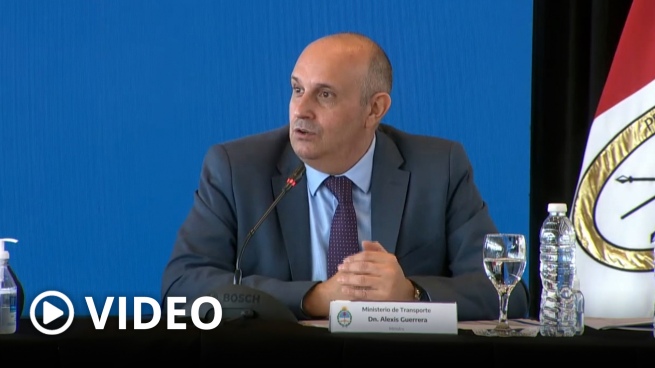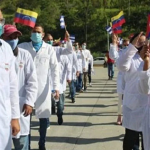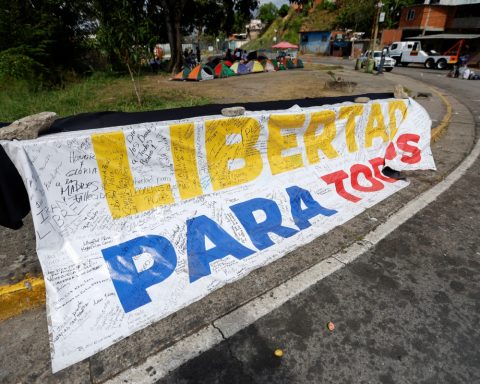Guerrera to the Federal Council: “The Waterway of the next 20 years will emerge from here”
WATCH VIDEO
The Minister of Transportation, Alexis Guerrera, said that the Federal Waterway Council will be responsible for defining the next 20 years of the navigable complex, by presiding over the meeting in Rosario that began the operation of the National Entity for Control and Management, which will forward the bidding process for the Paraná-Paraguay waterway.
“This Federal Council was the first to begin to debate, with governors and ministers, what were the steps to follow with the waterway and, at the request of this political decision by President Alberto Fernández, today it is taking a clear and effective step, which It is the beginning of the operation of the Federal Entity for the Control and Management of the Navigable Way”, said Guerrera.
This waterway ends its concession after 26 years and “had been designed with other ports, with another level of production and vessels, so we are forced to update ourselves,” he said.
“One of the first tasks that the Entity must undertake is to expand the limits of what was known during these years, open the borders of that definition knowing what we want and need to reach other provinces,” he remarked.
The main objective of the Control and Management Entity is to carry out the national and international bidding process for the award of works, designing a process that guarantees integrity and transparency, promotes citizen participation, guarantees the right of access to public information and promote accountability as axes for the execution of public works.
“There is enormous potential in the regional economies that would lower logistics costs using this Waterway,” said the Minister of Transportation.
In that sense, he pointed out that “there are public ports in provinces whose governors are demanding the possibility of them being part of this system.”
Guerrera considered that “to respond to this need, we must work thinking about how the waterway can be combined with the land of the railway and the automotive transport system and begin to lower the costs of logistics, which is one of the main problems we have. as an exporting country.
“For this reason, in the next meetings they must define the draft we need, the width we need, the rest places, the accesses to ports, the expansion of its limits, thinking about the Argentina of today and the Argentina of the future,” he concluded. the official.
The governor of Santa Fe, Omar Perotti, pointed out: “We are facing the opportunity to shape a Waterway that continues deepening progress, adding investment, with more value added at source; and that guarantees us a higher level of roots in each province and of work for all Argentines”.
“This Federal Council was the first to begin to debate, with governors and ministers, what were the steps to follow with the waterway and, at the request of this political decision by President Alberto Fernández, today it is taking a clear and effective step, which It is the beginning of the operation of the Federal Entity for Control and Management of the Navigable Way”alexis warrior
“Having a federal instance of control with participation is key to knowing the cost of logistics and for the constant search for a good service with the corresponding environmental care,” he stressed.
And he added: “It will also be possible to analyze and improve the tools for the development of each one of the regional economies.”
For his part, the governor of Buenos Aires, Axel Kicillof, considered a “substantial change” the role that the State has had in the collection of tolls “which provided more control and clarity on the relationship between income and jobs that exist to do to give more functionality to the trunk waterway”.

He then stated that “the main problem today is that the river complex is artificially separated from the seaport complex and this has to do with the need to carry out the works on the Magdalena Canal.”
In that sense, he asked “to advance the construction of the Canal as soon as possible”, and considered that it is “a question of sovereignty”.
In his turn, the Governor of Chaco, Jorge Capitanich, said that “it is important to correct fiscal, financial, legal, customs, and logistical asymmetries between the signatory countries in order to promote the development of a competitive and regionally articulated river fleet to guarantee the join with maritime commerce”.
At the same time, he emphasized that “there must be an investment from Santa Fe to the north, otherwise the asymmetries of the regional economies will continue to deepen” and asserted: “We do not want to continue being left for the end, we want equality for competitiveness “.
In this sense, he pointed out that “decisions must be made and integrated logistics must be transformed for competitiveness”.
“Otherwise,” he remarked, “when the adverse social indicators overwhelm us, ultimately, the responsibility will also be ours and we are going to emphatically defend what we need to develop our economies.”
The governor of Formosa, Gildo Insfrán, agreed on this point and added: “Between 17 and 19 million tons of different products pass through my province annually and we cannot contribute anything at all because the only ones that pass through are the Paraguayan barges, Brazilian and Bolivian.
“One of the first tasks that the Entity must undertake is to expand the limits of what was known during these years, open the borders of that definition knowing what we want and need to reach other provinces”alexis warrior
“We have legal impediments that make it impossible for us to use those barges to be able to load the small things that we produce,” he reinforced, and considered that “this is the right environment to correct it.”
Finally, the deputy governor of Entre Ríos, Laura Stratta, celebrated “this new meeting of the Federal Council, because we consider it a political and strategic space for each of the provinces, and also for the country.”
“It is the first time in 26 years that the seven provinces have the possibility to define, decide and form part of the Entity, within the framework of the management and control of the Waterway; and we want our voices to be heard,” he remarked.
During the meeting, it was defined that the next meeting of the Board of Directors of the National Control and Management Entity will be held on June 24 to ensure continued work and a look at the tasks carried out,” official sources stated.


















